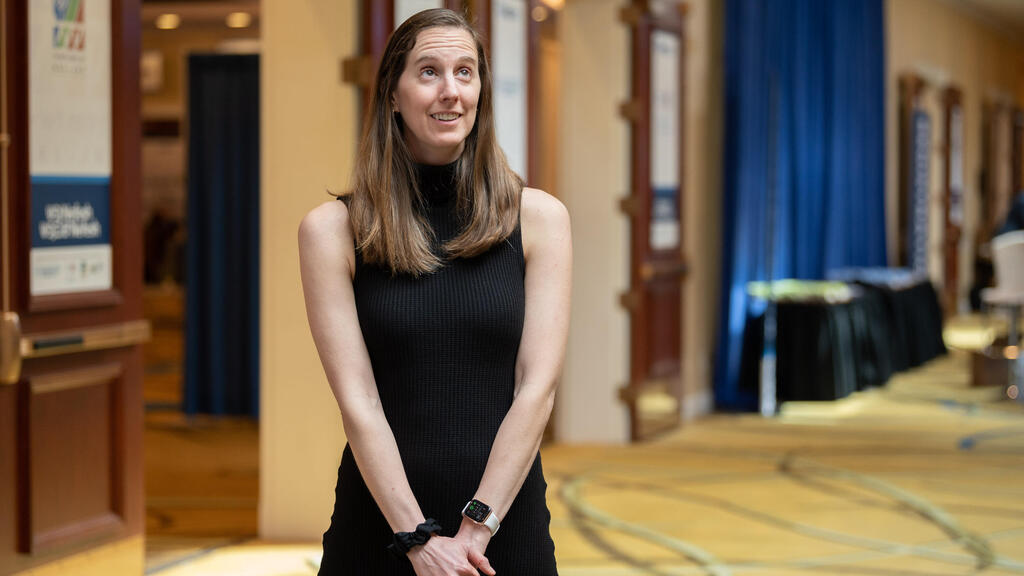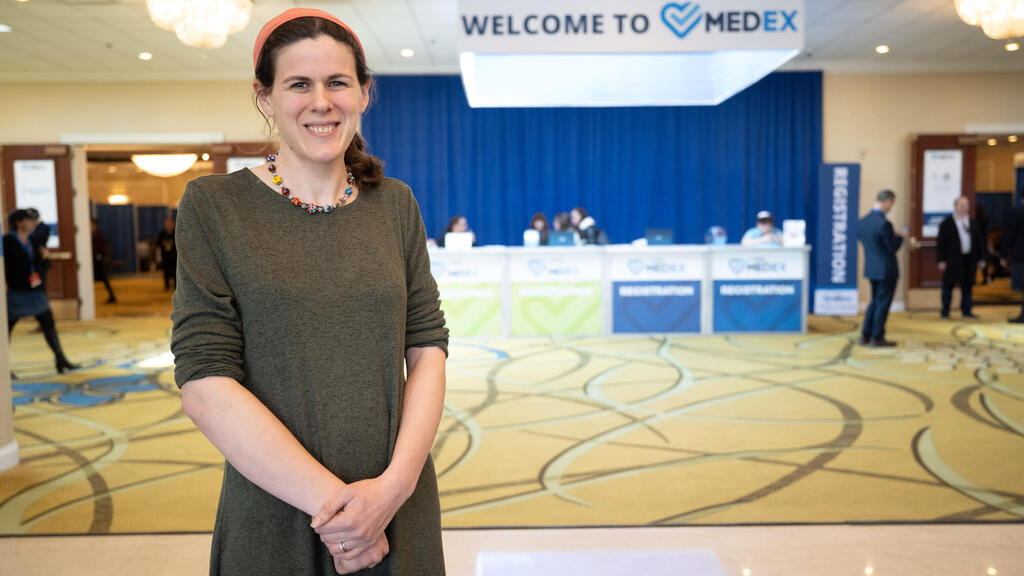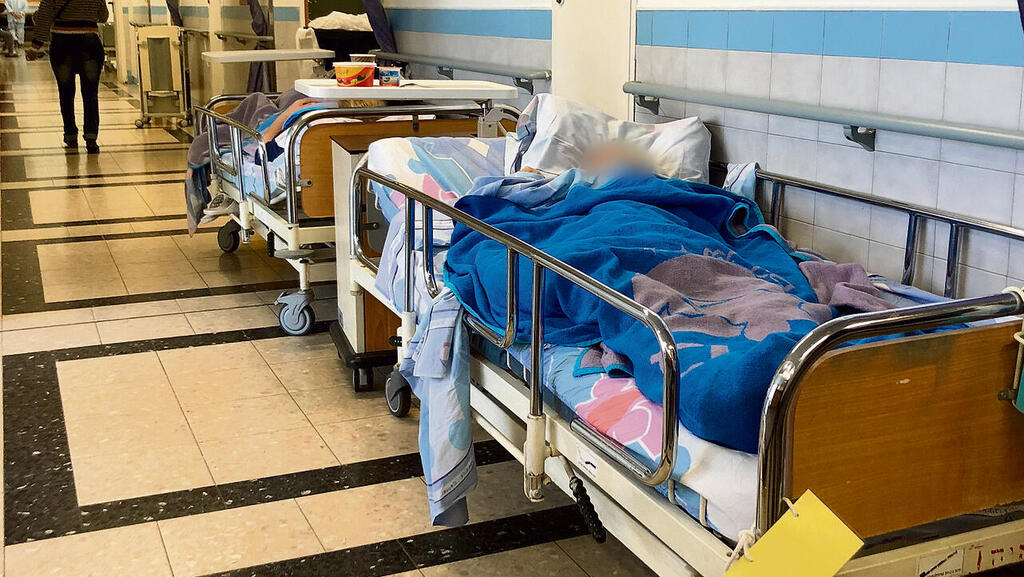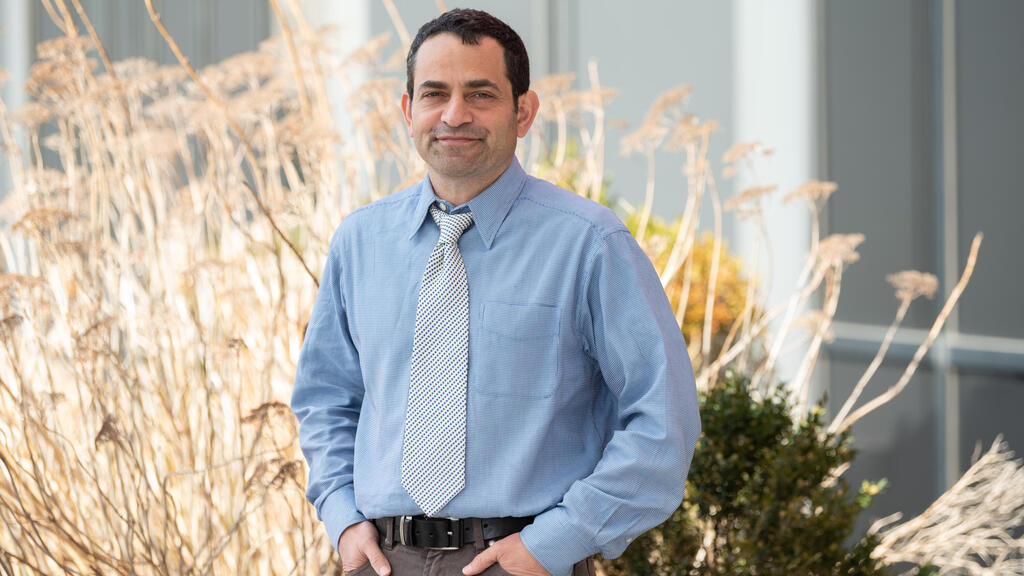There is a moment when speaking to Alexis Carlin about her decision that she interrupts herself and pauses to contemplate on how she’s about to change her whole life as she knows it.
Related stories:
“I’m leaving my community,” she said. Carlin, a 33-year-old from Philadelphia, is a pediatric neurologist and will be making Aliyah next summer with her Israeli partner.
She spoke to Ynet on the sidelines of MedEx, a conference hosted by Nefesh B’Nefesh in cooperation with the Ministry of Health in Teaneck, New Jersey. Their goal? To help make it easier to bring medical professionals to Israel and integrate them into the healthcare system.
At the conference, which hosted some 350 medical professionals from North America, they met with representatives of Israel’s largest health funds and hospitals to learn about employment opportunities.
Olim are considering making Aliyah at a precarious time for the country when even some Israelis are contemplating leaving, but there are staunch Zionists in the US looking to do the opposite. These supporters of the Jewish state want to tie their fate to the country but admit there are challenges due today’s current political situation.
Dani Halpern, a 33-year-old from Boston, is a married mother of three and an internist and pediatrician. She graduated from medical school in 2015 and has worked at a hospital in her hometown ever since.
Halpern, an Orthodox woman, echoes the words of Minister Orit Struck, who asserted that doctors shouldn’t have to provide treatment that goes against their faith.
“I don’t bring my religion into treatment of patients,” she said. “I’ll always do everything for those who are sick. I take care of people from the cradle to the grave. In my work in Boston, I see all walks of life. I don’t care where they are from. It doesn’t impact my work.”
Yet, she does admit that the judicial overhaul being discussed in Israel made her think twice about Aliyah. "I did have second thoughts because of what is happening, but no place is perfect.”
As for Carlin, who works at a children’s hospital in Philadelphia and plans to live in Givatayim once she’s in Israel, she hasn’t yet settled on where she wants to work. She arrived at MedEx in order to convert her medical license.
'There's still a long way to go in Israel'
In the U.S., the opposite is true, and the disparities in healthcare accessibility between rich and poor people are among the largest in the world.
"There’s no place where everything is orderly and works well," says Halpern. "I like working in a place where everyone has somewhere to turn to when they have a medical problem. I think there’s still a long way to go in Israel.”
"When we decided to be together, my husband and I came to a compromise that he would stay in the US during my internship, and when we finished we would move to Israel," she said.
"This was always our plan. My family is here and his is in Israel. It's tough for him, even though he loves life here. Regarding Israel, I remember being very surprised when I saw children walking around outside the house in the evening. In Philadelphia, I don't let the kids hang out outside the house because it's tough."
For now, she’s not letting the current political controversy unfolding in Israel get to her. “I know there’s an attempt to change the legal system and there are many worried people who are taking to the streets to protest. But I also see that Israelis know how to stand up for themselves and fight. In any event, my husband and I promised each other that we’d make Aliyah, even though it’s not easy to pick up and leave with a small child at home. But coming to MedEx was a big part of this process.”
A national mission
The potential olim (immigrants) make their way from vendor to vendor to hear about the options that await them in Israel. In tandem, Ministry of Health officials were on hand to check and process the paperwork one needs in order to officially practice medicine in Israel.
Since 2002 Nefesh B’Nefesh has assisted more than 840 physicians and 2,900 medical professionals with their Aliyah process. Most are now employed in hospitals, Israel’s health funds (HMOs), and the private sector.
Dr. Sefi Mendelovich, Deputy Director General of Israel’s Health Ministry, who attended the conference, said, “Recently, the Ministry of Health has dedicated itself to addressing the shortage of doctors in the Israeli health system. Among other initiatives, we are working to bring some 600 doctors to Israel each year - which will triple the current number. This is a national undertaking of the utmost importance.”
Dr. Mendolovich also added that the Health Ministry “hopes to recruit dozens of physician assistants - a new discipline within the Israeli medical system - and integrate them into Israel’s healthcare industry accordingly.”
The conference is also in cooperation with Israel’s Ministry of Aliyah and Integration, The Jewish Agency for Israel, Keren Kayemeth LeIsrael (KKL), and the Jewish National Fund-USA and the Israel Medical Association.
Rabbi Yehoshua Fass, Co-Founder and Executive Director of Nefesh B’Nefesh, said, "We’re hosting this important event for yet another year after recognizing the critical need for quality personnel in the Israeli healthcare system. At the conference, we are bringing together skilled and experienced people who can contribute to the country immediately.
I am sure that meetings between the best of the healthcare system and hundreds of talented medical professionals from North America will strengthen the medical infrastructure in Israel."
Meanwhile, David Raine, 46, an electrophysicist from Michigan, also decided to make Aliyah in the coming months.
"Living in Israel will make me happy"
"Ever since I was a kid, I thought about living in Israel," he says. "My mother is Israeli and we always had family in Israel. I’d visit every year or two. The job market in Israel for electrophysicists is small and there are not many options. When I talked to people in hospitals like Hadassah Medical Center and Sheba Tel Hashomer there was no room."
Like many MedEx employees, Raine is living a comfortable life in the states. “You have to decide what’s important to you, where you want to be and what will make you happy,” he explained. "I realized that living in Israel will make me happy. That's where I see myself in the future, and that's where I'll feel like I'm contributing the most to society. I want to make my own small contribution."
Raine also weighed in on the current legal controversy in Israel. " Is this a concern? It is difficult to judge from thousands of miles away, but it did not make me stop my Aliyah process. Doctors are obliged to treat all patients regardless of color, creed or gender. We must take care of everyone and we must not ignore people's rights."
Raine’s Aliyah may be easier than most because he will initially move in with family and he’s also aware that some who make Aliyah end up going back to their home country.
"When someone makes Aliyah, the question is often whether they will stay," he said. "Expectations and reality are not always the same. Americans face many challenges when they make Aliyah. They must acclimate to society, there’s a language barrier, cultural differences, and economic challenges.
“There are things you must accept to live in Israel. The price of a bag of potato chips in Israel is eight shekels, while in the US it’s only three. Everything is double the price. The price of cars is also double. In addition, many immigrants from the US want to live in Tel Aviv, where the cost of living is significantly higher.”
But there is hope that things will change and there is no doubt that Aliyah is a gamble. The question is where do you see yourself most satisfied? In the end, money doesn't buy you happiness. If you earn a million dollars a year it won't necessarily make you happy."
According to The Jewish Agency for Israel data, there has been a steady stream of immigrants arriving from the United States. Currently, Israel welcomes some 3,200 to 3,700 olim from the US per year and in 2021 saw a record 4,600 due to the Covid-19 pandemic.
"The pandemic caused a small pause in moving to Israel, but soon afterwards there was a surge in requests to arrive,” explains Ronen Fuxman, Head of the Post Aliyah & Advocacy Division of Nefesh B'Nefesh. "This number will likely serve as the baseline in the future.”
The rise in antisemitic cases directed at the Jewish community in the U.S. in recent years is also a reason for the increasing interest in Aliyah. "We hear that racism and antisemitism are on the rise.
People today are much less ashamed to express themselves in an antisemitic manner, unlike in the past," explains Fuxman. “We have a retention rate of 90% during the first three years of Aliyah. This has been based on a model of successful Aliyah planning in advance of the move, which leads to a successful Aliyah and integration following the move.
When a physician comes here and knows that I am taking care of this entire complex process, to transfer a career with all the necessary approvals, it reassures them and gives a feeling of confidence. Even outside of medicine, if a new Oleh approaches me saying they are an expert in preserving buildings, I will connect them with someone in their field of expertise.
We will make sure they have additional health insurance, and that they know what it means to move to the periphery. If a person is not met with any surprises, they know exactly where they are going, and speak to people who have made the same steps, the integration will be much more successful.
Fuxman knows that protests in Israel have an impact on interest in Aliyah, but according to him, it isn’t a dramatic one. "I think they are less concerned about it."
"When the protests began in the country, the increase in terrorist attacks began almost simultaneously. We actually received more calls from people who said they had second thoughts about Aliyah because of the security situation, rather than the judicial overhaul."








